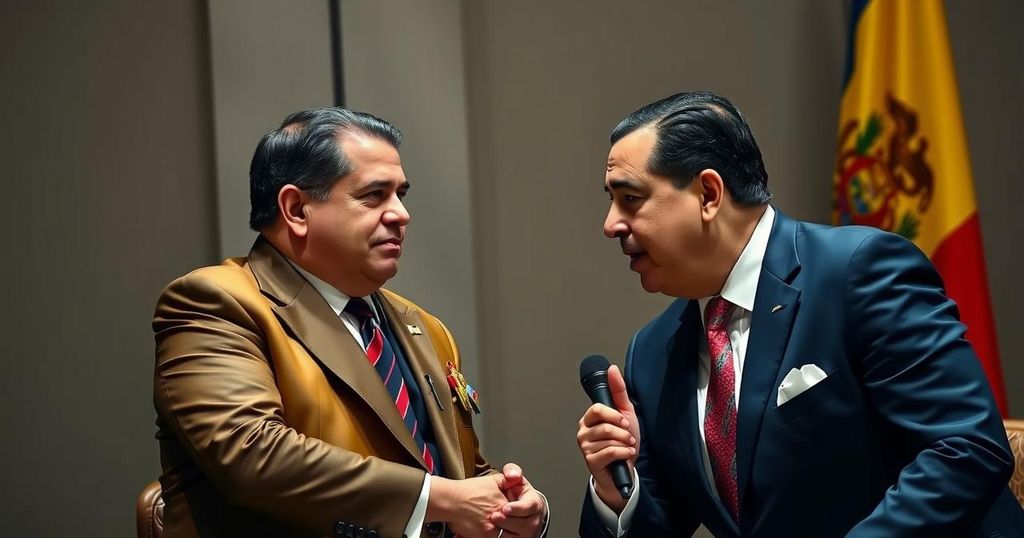Venezuelan Opposition Leader Pleads for Colombia’s Support in Electoral Dispute
Venezuelan opposition leader Maria Corina Machado has urged Colombian President Gustavo Petro to acknowledge her coalition’s claim of victory in the disputed July presidential election. Addressing the Colombian Senate, Machado emphasized the need for decisive action against President Nicolás Maduro’s regime, which she accuses of electoral fraud and repression. She warns of the regional security threats posed by a prolonged Maduro administration and seeks international support for a governmental transition in Venezuela.
Venezuelan opposition leader Maria Corina Machado has appealed to Colombian President Gustavo Petro to officially recognize her coalition’s victory in the contentious presidential elections held in Venezuela in July. In a virtual address to Colombia’s Senate, Machado underscored her dissatisfaction with President Nicolás Maduro’s electoral results, which were declared in favor of Maduro’s administration shortly after the voting concluded. These results were met with skepticism as detailed figures were not provided, with the electoral authorities attributing the lack of transparency to a cyberattack on their systems. Conversely, Machado’s coalition claimed to have verified results from over 80% of voting machines, which suggest that opposition candidate Edmundo González won the election by a considerable margin. Machado, currently in hiding due to fears of arrest, urged President Petro to take definitive action regarding the situation in Venezuela, reinforcing that “silence is no longer an option in the face of what is happening in Venezuela.” She advocated for constructive negotiations, reaffirming her commitment to the wishes of the Venezuelan electorate expressed during the elections on July 28. In her address, Machado warned Colombian senators of the regional security threats posed by a prolonged Maduro administration, linking it to the rise of guerrilla groups operating across the border. She expressed that Maduro’s rule has transformed Venezuela into a sanctuary for these groups, which complicates President Petro’s peace initiatives aimed at addressing conflict with Colombian rebel factions. Despite previous diplomatic efforts by President Petro alongside Brazilian and Mexican leaders to mediate the electoral disputes, these initiatives have resulted in little progress as Maduro has taken steps to consolidate his regime, including dismissing opponents and reshuffling his government. Opposition candidate Edmundo González, who has fled Venezuela following an arrest warrant connected to the publication of electoral results, reflects the growing tension and hostility faced by critics of the Maduro administration. In the meantime, the national government has also promised to act as a guarantor for peace negotiations with Colombian rebels, although these discussions have yet to yield substantial outcomes.
The Venezuelan political landscape has been marked by intense conflict and controversy, particularly surrounding elections that are frequently disputed. The most recent presidential election in July was no exception, with claims of electoral malpractice from opposition leaders against the ruling party. Maria Corina Machado, a prominent figure within the opposition, has become increasingly vocal in rallying support against Maduro’s government, which is often accused of authoritarian practices including the suppression of dissent and manipulation of electoral processes. The support of neighboring Colombia is seen as crucial to her faction’s efforts, especially given the intertwined histories and political agendas of the two nations, particularly concerning issues of peace and security as they relate to rebel groups operating across borders.
Overall, Maria Corina Machado’s call for recognition from Colombia’s President Gustavo Petro highlights the need for international intervention in Venezuela’s political crisis. The allegations of election fraud, the ongoing repression against opposition figures, and the regional security implications of continued Maduro leadership underscore the urgency of addressing these issues. As the new presidential term approaches on January 10, the resolution of these disputes remains critical not only for Venezuela but for the stability of the wider region.
Original Source: www.oneindia.com




Post Comment